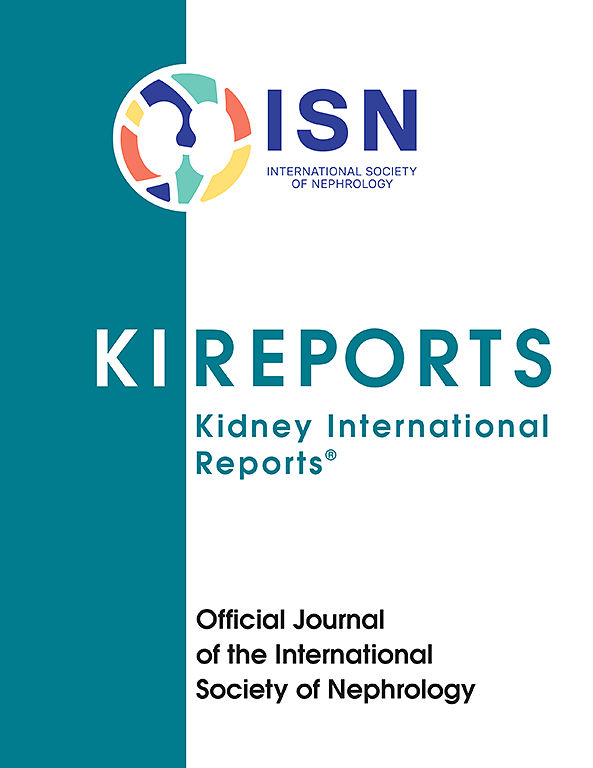Thrombotic Microangiopathy After Kidney Transplantation: Insights Into Genetic Etiology and Clinical Outcomes
IF 5.7
2区 医学
Q1 UROLOGY & NEPHROLOGY
引用次数: 0
Abstract
Introduction
Thrombotic microangiopathy (TMA), characterized by small-vessel thrombosis caused by endothelial injury, presents significant diagnostic and treatment challenges in kidney transplantation.
Methods
To investigate the factors associated with posttransplant TMA, we conducted a retrospective study of 3535 kidney transplant recipients at our center from 2008 to 2023.
Results
Sixty-eight patients were diagnosed with TMA, and 93% (63 of 68) underwent genetic testing. Patients were categorized into 3 groups based on the TMA etiology. Group 1 (n = 42, 62%) included patients with complement-mediated TMA associated with genetic or acquired complement abnormalities. These patients were younger and had a higher incidence of hypertension (HTN) or preeclampsia as the causes of end-stage kidney disease (ESKD). Notably, 33% of patients developed recurrent TMA, and approximately 78% of those with recurrent TMA lost their allografts. Group 2 (n = 14, 21%) had TMA associated with calcineurin inhibitors (CNIs) or ischemia-reperfusion injury (IRI), showing longer cold ischemia times (CITs) (19.9 ± 8.7 hours vs. 10.7 ± 8.9 hours; P = 0.0001) and a higher rate of delayed graft function (DGF) (43% vs. 13%, P = 0.0008) than the controls. Group 3 (n = 12, 17%) had TMA from diverse causes (infections or autoimmune disorders) and exhibited a poor response to anticomplement therapy. No genetic variants were identified in this group.
Conclusion
Our findings underscore the need for comprehensive pre and posttransplantation genetic testing to predict and manage the risk of TMA and prevent graft loss. CNIs may exacerbate the risk of posttransplant TMA in the presence of other complement-activating factors. Our study also highlights the importance of personalized strategies and early interventions based on the functional assessment of variants of uncertain significance (VUS).

肾移植后血栓性微血管病:遗传病因和临床结果的见解
血栓性微血管病(TMA)以内皮损伤引起的小血管血栓为特征,在肾移植中提出了重大的诊断和治疗挑战。方法为了探讨肾移植后TMA的相关因素,我们对2008年至2023年在我中心进行的3535例肾移植受者进行了回顾性研究。结果确诊TMA患者68例,其中93%(63 / 68)接受了基因检测。根据TMA病因将患者分为3组。第1组(n = 42, 62%)包括补体介导的TMA与遗传或获得性补体异常相关的患者。这些患者较年轻,高血压(HTN)或先兆子痫(终末期肾病(ESKD)的发生率较高。值得注意的是,33%的患者复发性TMA,大约78%的复发性TMA患者失去了他们的同种异体移植物。2组(n = 14, 21%) TMA伴钙调磷酸酶抑制剂(CNIs)或缺血再灌注损伤(IRI),冷缺血时间(CITs)延长(19.9±8.7小时vs 10.7±8.9小时);P = 0.0001),延迟移植物功能(DGF)率(43%比13%,P = 0.0008)高于对照组。组3 (n = 12,17 %)有多种原因的TMA(感染或自身免疫性疾病),对抗补体治疗反应较差。在这一组中没有发现遗传变异。结论我们的研究结果强调了在移植前和移植后进行全面的基因检测以预测和管理TMA风险并预防移植物丢失的必要性。在其他补体激活因子存在的情况下,cni可能加剧移植后TMA的风险。我们的研究还强调了基于不确定意义变异(VUS)功能评估的个性化策略和早期干预的重要性。
本文章由计算机程序翻译,如有差异,请以英文原文为准。
求助全文
约1分钟内获得全文
求助全文
来源期刊

Kidney International Reports
Medicine-Nephrology
CiteScore
7.70
自引率
3.30%
发文量
1578
审稿时长
8 weeks
期刊介绍:
Kidney International Reports, an official journal of the International Society of Nephrology, is a peer-reviewed, open access journal devoted to the publication of leading research and developments related to kidney disease. With the primary aim of contributing to improved care of patients with kidney disease, the journal will publish original clinical and select translational articles and educational content related to the pathogenesis, evaluation and management of acute and chronic kidney disease, end stage renal disease (including transplantation), acid-base, fluid and electrolyte disturbances and hypertension. Of particular interest are submissions related to clinical trials, epidemiology, systematic reviews (including meta-analyses) and outcomes research. The journal will also provide a platform for wider dissemination of national and regional guidelines as well as consensus meeting reports.
 求助内容:
求助内容: 应助结果提醒方式:
应助结果提醒方式:


